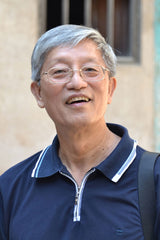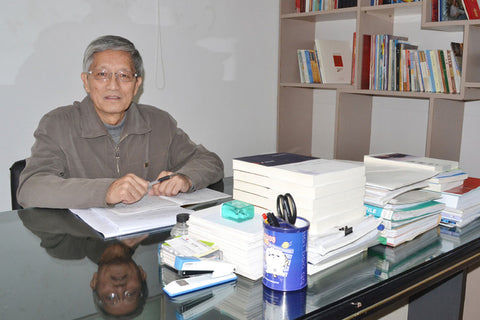A Lesson Taught in Many Teochew Families
I was born in Teochew (Chaozhou city). My paternal grandfather and grandmother died early. Ever since my first awareness of things around me, my parents never stopped emphasising in my education at home to “always be filial”, as this is the greatest of all virtues. “Always be filial” is a lesson taught in many Teochew families.
我出生在潮州,爷爷奶奶早逝,从自己初晓世事起,在家里接受教育过程中,父母不断地嘱咐自己“要行孝”,因为“百善孝为先”。“要行孝”成为许多潮州家庭的一项“必修课”。
I have six younger brothers and sisters. With my own eyes, I witnessed how my parents raised all of us to adulthood with their meagre incomes from teaching and sewing embroidery under the dim light of the kerosene lamp.
我以下还有6个弟妹,亲眼目睹父母如何靠教书的微薄工资和在昏暗煤油灯下绣花所得的辛苦钱把我们养育成人,使自己对“要行孝”有了深层次的理解。

In autumn of 1960, I enrolled into university in Beijing as a 19-year-old. In autumn of 1965 I was assigned to the Guangdong office of the Xinhua news agency and thus began my life as a journalist. I recall my first pay-cheque was a half-month salary advance of 30 yuan, of which I immediately sent 20 yuan to my parents. Subsequently I remitted part of my pay home every month. Some time later I was transferred to the “frontline” (of the mainland China-Taiwan conflict) of those days, at the Xinhua news agency in Fujian.
1960年秋,19岁的我到北京读大学,1965年秋分配到新华社广东分社,开始记者生涯,首次领到半个月的30多元工资,马上拨出20元寄给父母,以后都按月寄钱回家。随后调往当时的前线—新华社福建分社。
Just to See My Parents
Even though l was constantly on the move, I never forgot the three words “always be filial”. Every Chinese New Year was a 600 kilometre trip for my wife, daughter and myself for reunion with my parents and siblings, before I returned to work a few days later. Whenever there was an assignment in Fujian’s Zhao’an county that is close to Teochew, I would quietly “sneak through the borders” just to see my parents.
尽管四处奔波,仍记住“要行孝”这三字,每年春节都和妻子和儿女一起跋涉600公里,回故乡与父母、弟妹团聚,没几天又得匆忙回去工作。一有机会到离潮州最近的诏安县一带采访,就悄悄“越境”去看望父母。
In 1997 – when my parents and parents-in-law were at a combined age of 320 years, I was finally allowed back to Swatow, falling just short of my sixties at 56. After retirement, I was invited to begin a second career at the Teo-swa (Chaoshan) Historical Culture Research Centre. Life became busy once more, and I was torn between service to society and being filial.
1997年,父母和岳父母的年龄总和近320岁时,56岁的我才调回汕头,因未过花甲,勉强算是“少小离家老大归”。退休后应邀到潮汕历史文化研究中心第二次“就业”,又忙得不亦乐乎,难以“忠孝两全”。
When second retirement arrived at the age of 70, my wife and I moved from Swatow back to Teochew and there we rotated weekly “shifts” with my three younger brothers to stay with my parents. On 21 April 2014 my mother passed away at 92 years. My father was then 95. He was still clear in his thoughts, but physically weak due to old age. Although he is looked after by a caregiver in the evening, a family member was always needed nearby.
70岁第二次“退休”后,我和妻子一起从汕头赶到潮州,跟三位弟弟轮流侍奉父母,每家“值班”一周。2014年4月21日,92岁的母亲仙逝,时年父亲已95岁,头脑还清楚,毕竟已是耄耋之年,步履蹒跚,晚上虽有护工陪伴,仍需有亲人在身边。

"Used only in the Hour of Need”
My father insists on living in the old house, there are only two rooms, including one taken up by the caregiver. As such, whenever my wife and I are on duty, we stay in a hostel nearby. Every morning we would set off at 7am, walking or taking a “three-wheeler” to the market, reach father’s house at 8am and remain there to chat with him. For his meals, bite-sized food is prepared. Because he has weak digestion and has lost his teeth, the normal portions for meat and rice are too big. Each day my wife and I have to ask what he wishes to eat to plan for the following day menu. And as he cannot eat dry rice, we cook porridge twice a day. He likes bean porridge best, along with soup noodle and dumplings. For the dumpling fillings, we ask the butcher to mince the meat twice, and we then do once more at home.
父亲坚持要住自己的家,里面只有两间房,其中一间供护工使用。如今,只要排到我和妻子“值班”时,我们就住在离父亲近两公里的旅社,每天早上七点左右出发,步行或乘三轮车到菜市场采购,8点多到父亲家,就一直呆在里面,跟父亲聊天,然后就为他做饭、准备点心。父亲消化力减退,装假牙,不适合大口吃肉,大碗吃饭,我和妻子就事先征求他要吃什么,然后订出第二天的菜谱。他不能吃干饭,两顿饭就都做稀饭,其中有他最喜欢吃的豆粥,还有汤面和饺子,饺子馅则请肉档摊主连铰两遍,回家再剁一次。
My father feels sorry that my wife and I, two septuagenarians (past-70 years), have to take care of him a nonagenarian (96 year-old). But we will jokingly remind him of the Chinese saying that “an army is kept for a thousand days, and used only in the hour of need”. Now that you need the care of your children most, we as your children are only fulfilling our filial duties.
父亲看我们两个“70后”(70多岁)侍候他“90”后(96岁),老觉得过意不去,我们答道:“养兵千日,用在一时”,现在正是您最需要儿女照顾的时候,我们做儿女的更应该尽孝。
About the author 关于作者:
Heng Ui Tong (Wang Weizhong) was born in Teochew in 1941. He graduated in the Renmin University Faculty of Journalism in 1965. He held various senior positions at the Xinhua news agency, including being Deputy Bureau Chief of Fujian Province. After retiring from the press, he served as chairman of the Teo-swa (Chaoshan) Historical Culture Research Centre and contributed to the successful inclusion of The “Qiaopi and Yinxin Correspondence and Remittance Documents from Overseas Chinese” documentary heritage in the UNESCO Memory of the World Register. The archival collection has 160,000 pieces of artefacts, of which over 100,000 originate from the Teochew region.
王炜中,潮州人,1941年出生。1965年毕业于中国人民大学新闻系,毕业后在新华社工作,曾担任新华社福建分社副社长等职务。退休后曾担任潮汕历史文化研究中心理事长,曾参与申报广东、福建两省的侨批档案入选联合国教科文组织《世界记忆名录》。其中侨批档案16万件文物,超过10万件来之潮州地区。
You may be interested also to read earlier submissions for The Teochew Store "My Teochew Family Story Sharing"
- "潮州一家人" by Elizabeth Koh
- "Trivia Tales from Shatin 沙田人琐事 - 介绍" by Ben Choi
- "My Special Teochew Family 特别的潮州家人" by Harada Ryotaro 原田燎太郎
"Like" our Facebook page to stay updated with The Teochew Store.
